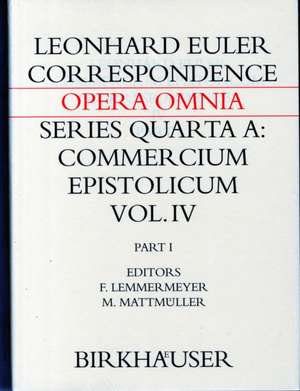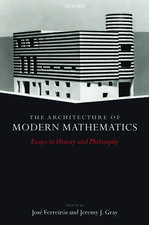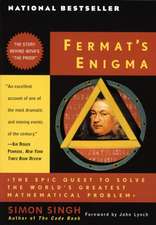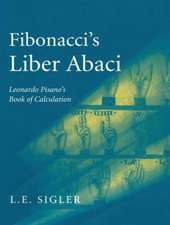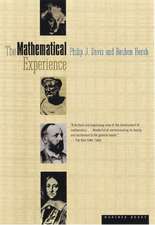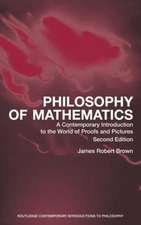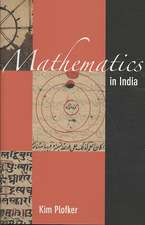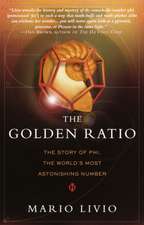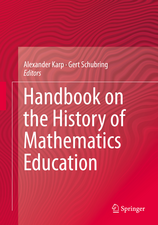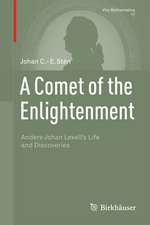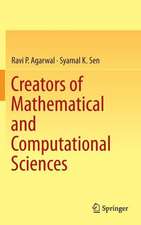Correspondence of Leonhard Euler with Christian Goldbach: Volume 1: Leonhard Euler, Opera Omnia, cartea 4A / 4.1
Autor Leonhard Euler Editat de Martin Mattmüller, Franz Lemmermeyeren Limba Engleză Hardback – 12 oct 2015
This exchange – Euler’s most substantial long-term correspondence – has now been edited for the first time with an English translation, ample commentary and documentary indices. These present an overview of 18th-century number theory, its sources and repercussions, many details of the protagonists’ biographies, and a wealth of insights into academic life in St. Petersburg and Berlin between 1725 and 1765.
Part I includes an introduction and the original texts of the Euler-Goldbach letters, while Part II presents the English translations and documentary indices.
Din seria Leonhard Euler, Opera Omnia
- 15%
 Preț: 689.64 lei
Preț: 689.64 lei - 23%
 Preț: 674.49 lei
Preț: 674.49 lei - 14%
 Preț: 1272.84 lei
Preț: 1272.84 lei - 27%
 Preț: 945.90 lei
Preț: 945.90 lei - 27%
 Preț: 983.14 lei
Preț: 983.14 lei - 27%
 Preț: 967.25 lei
Preț: 967.25 lei - 27%
 Preț: 954.77 lei
Preț: 954.77 lei - 27%
 Preț: 1287.83 lei
Preț: 1287.83 lei - 27%
 Preț: 969.63 lei
Preț: 969.63 lei - 27%
 Preț: 967.96 lei
Preț: 967.96 lei - 27%
 Preț: 964.86 lei
Preț: 964.86 lei - 27%
 Preț: 976.38 lei
Preț: 976.38 lei - 27%
 Preț: 1293.44 lei
Preț: 1293.44 lei - 27%
 Preț: 959.93 lei
Preț: 959.93 lei - 27%
 Preț: 978.93 lei
Preț: 978.93 lei - 27%
 Preț: 959.10 lei
Preț: 959.10 lei - 9%
 Preț: 843.24 lei
Preț: 843.24 lei - 8%
 Preț: 616.41 lei
Preț: 616.41 lei - 9%
 Preț: 798.70 lei
Preț: 798.70 lei - 37%
 Preț: 909.80 lei
Preț: 909.80 lei - 9%
 Preț: 838.07 lei
Preț: 838.07 lei - 9%
 Preț: 838.74 lei
Preț: 838.74 lei - 9%
 Preț: 830.73 lei
Preț: 830.73 lei - 9%
 Preț: 809.63 lei
Preț: 809.63 lei - 9%
 Preț: 832.31 lei
Preț: 832.31 lei - 9%
 Preț: 770.91 lei
Preț: 770.91 lei - 8%
 Preț: 598.30 lei
Preț: 598.30 lei - 8%
 Preț: 578.82 lei
Preț: 578.82 lei - 8%
 Preț: 634.81 lei
Preț: 634.81 lei - 8%
 Preț: 593.73 lei
Preț: 593.73 lei - 37%
 Preț: 897.56 lei
Preț: 897.56 lei - 9%
 Preț: 831.36 lei
Preț: 831.36 lei - 8%
 Preț: 631.89 lei
Preț: 631.89 lei - 8%
 Preț: 605.36 lei
Preț: 605.36 lei - 9%
 Preț: 806.39 lei
Preț: 806.39 lei - 9%
 Preț: 838.43 lei
Preț: 838.43 lei - 9%
 Preț: 801.60 lei
Preț: 801.60 lei - 8%
 Preț: 597.94 lei
Preț: 597.94 lei - 8%
 Preț: 652.65 lei
Preț: 652.65 lei - 9%
 Preț: 839.09 lei
Preț: 839.09 lei - 8%
 Preț: 589.25 lei
Preț: 589.25 lei - 9%
 Preț: 817.96 lei
Preț: 817.96 lei - 9%
 Preț: 832.63 lei
Preț: 832.63 lei - 8%
 Preț: 580.47 lei
Preț: 580.47 lei - 8%
 Preț: 608.92 lei
Preț: 608.92 lei - 9%
 Preț: 817.96 lei
Preț: 817.96 lei - 8%
 Preț: 624.11 lei
Preț: 624.11 lei - 9%
 Preț: 828.20 lei
Preț: 828.20 lei - 8%
 Preț: 656.49 lei
Preț: 656.49 lei
Preț: 982.39 lei
Preț vechi: 1198.04 lei
-18% Nou
Puncte Express: 1474
Preț estimativ în valută:
188.01€ • 195.77$ • 158.89£
188.01€ • 195.77$ • 158.89£
Carte disponibilă
Livrare economică 14-28 februarie
Preluare comenzi: 021 569.72.76
Specificații
ISBN-13: 9783034808927
ISBN-10: 3034808925
Pagini: 580
Ilustrații: XII, 580 p. 53 illus.
Dimensiuni: 200 x 275 x 37 mm
Greutate: 1.51 kg
Ediția:2015
Editura: Springer
Colecția Birkhäuser
Seriile Leonhard Euler, Opera Omnia, Commercium epistolicum
Locul publicării:Basel, Switzerland
ISBN-10: 3034808925
Pagini: 580
Ilustrații: XII, 580 p. 53 illus.
Dimensiuni: 200 x 275 x 37 mm
Greutate: 1.51 kg
Ediția:2015
Editura: Springer
Colecția Birkhäuser
Seriile Leonhard Euler, Opera Omnia, Commercium epistolicum
Locul publicării:Basel, Switzerland
Public țintă
ResearchCuprins
Preface.- Introduction.- 1 Historical and biographical setting.- 1.1. Christian Goldbach: A short biography.- 1.2. Goldbach and Euler.- 1.3. The Euler-Goldbach correspondence – chronology and statistics.- 2 Main subjects of the correspondence.- 2.1. Number theory.- 2.2. Analytic tools in number theory.- 2.3. Algebra: roots of polynomials and transcendence.- 2.4. Analysis.- 2.5. Geometry, topology, combinatorics.- 2.6. Natural science.- 2.7. Professional life: Academies, prizes, publications.- 2.8. Personal life: family, travel, health.- 3 Editing the Euler-Goldbach correspondence.- 3.1. Description of the manuscript sources.- 3.2. Prior editions.- 3.3. Editorial principles.- Correspondence with Christian Goldbach. Original Texts.- Translations.- Indices: Synoptic Table.- Bibliography.- Systematic Subject Index.- Name Index.
Recenzii
“The present book in the edition of Leonhard Euler's œuvre is concerned with the correspondence of Euler with Christian Goldbach. … The present volume is a pearl in the edition of Euler's correspondence and a must-read for historians of mathematics particularly interested in the history of number theory.” (Thomas Sonar, zbMATH 1361.01008, 2017)
Textul de pe ultima copertă
When Leonhard Euler first arrived at the Russian Academy of Sciences, at the age of 20, his career was supported and promoted by the Academy’s secretary, the Prussian jurist and amateur mathematician Christian Goldbach (1690-1764). Their encounter would grow into a lifelong friendship, as evinced by nearly 200 letters sent over 35 years.
This exchange – Euler’s most substantial long-term correspondence – has now been edited for the first time with an English translation, ample commentary and documentary indices. These present an overview of 18th-century number theory, its sources and repercussions, many details of the protagonists’ biographies, and a wealth of insights into academic life in St. Petersburg and Berlin between 1725 and 1765.
Part I includes an introduction and the original texts of the Euler-Goldbach letters, while Part II presents the English translations and documentary indices.
This exchange – Euler’s most substantial long-term correspondence – has now been edited for the first time with an English translation, ample commentary and documentary indices. These present an overview of 18th-century number theory, its sources and repercussions, many details of the protagonists’ biographies, and a wealth of insights into academic life in St. Petersburg and Berlin between 1725 and 1765.
Part I includes an introduction and the original texts of the Euler-Goldbach letters, while Part II presents the English translations and documentary indices.
Caracteristici
Documents the development of many of Euler’s most significant scientific achievements, particularly in number theory, including the Four Squares Theorem, the Pentagonal Number Theorem, Fermat’s Last Theorem, the Goldbach Conjecture, the Euler Formula on complex logarithms and the Polyhedron Formula Presents a wealth of insights into the protagonists’ biographies and into academic life in St. Petersburg and Berlin between 1725 and 1765 Provides an ample documentary index featuring hard-to-find biographic and bibliographic information Includes supplementary material: sn.pub/extras
